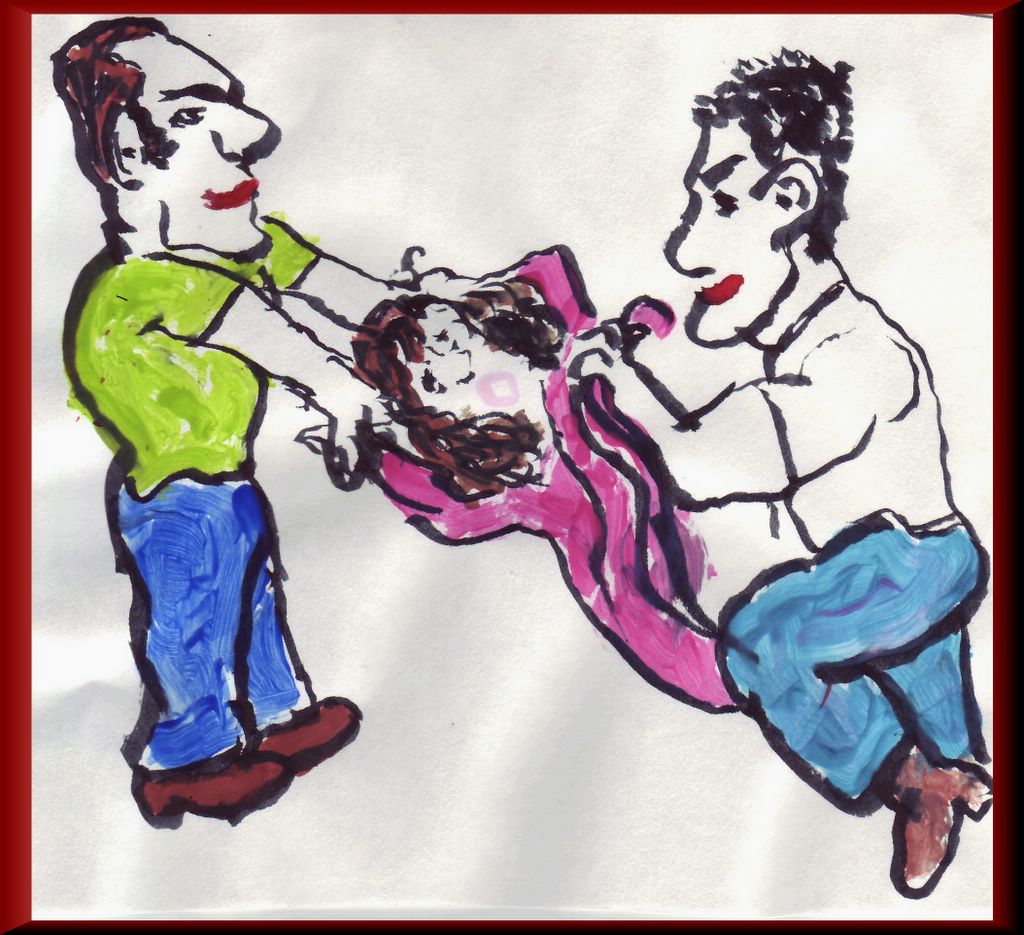As Richard Medhurst explains above, there is a video game that glamorizes the slaughter of the Iraqi people. This really is disgusting. The Iraq War was illegal and it continues and someone thinks the thing to do is turn it into fun and games. That is really disgusting.
As a parent when the Vietnam War was taking place, I did not let my children play war games.
I am surprised by how little that stance seems to register today.
This is C.I.'s "Iraq snapshot:"
Wednesday, March 31, 201021. Abeer.

Abeer Qassim Hamza al-Janabi is the 14-year-old Iraqi girl who was gang-raped and murdered March 12, 2006. The illustration to the right is from The Third Estate Sunday Review's "Justice for Abeer and her family?" and the illustration is of James Barker and Paul Cortez beginning the gang-rape of Abeer while Steven D. Green was in the other room murdering Abeer's five-year-old sister and her parents. For that article, we based the illustrations on Barker's confession in court. At the time, the Guardian of London summarized Barker's written testimony, ". . . Green dragged the father, mother and younger sister into a bedroom, while Abeer was left in the living room. . . . Barker said Cortez appeared to rape the girl [Abeer], and he followed. He said he heard gunshots and Mr. Green came out of the bedroom, saying he had killed the family, before raping the girl and shooting her with an AK-47."
War Criminal Steven D. Green is dead. AP's Brett Barrouquere, who has long covered Green, reports the 28-year-old Green was found dead in his Arizona prison cell on Saturday and that, currently, the operating belief is that it was a case of suicide.

May 7, 2009 Steven D. Green (pictured above) was convicted for his crimes in the March 12, 2006 gang-rape and murder of Abeer Qassim Hamza al-Janabi, the murder of her parents and the murder of her five-year-old sister while Green was serving in Iraq. Green was found to have killed all four, to have participated in the gang-rape of Abeer and to have been the ringleader of the conspiracy to commit the crimes and the conspiracy to cover them up. May 21, 2009, the federal jury deadlocked on the death penalty.
Alsumaria explained, "An ex-US soldier was found guilty for raping an Iraqi girl and killing her family in 2006 while he might face death sentence. . . . Eye witnesses have reported that Green shot dead the girl’s family in a bedroom while two other soldiers were raping her. Then, Green raped her in his turn and put a pillow on her face before shooting her. The soldiers set the body afire to cover their crime traces."
Evan Bright reported on the verdict:
As the jury entered the court room, Green(red sweater vest) let out a large sigh, not of relief, but seemingly of anxiety, knowing the weight of the words to come. As Judge Thomas Russell stated "The court will now publish the verdict," Green interlaced his fingers and clasped them over his chin. Russell read the verdict flatly and absolutely. Green went from looking down at each "guilty" to eyeing the jury. His shoulders dropped as he was convicted of count #11, aggravated sexual abuse, realizing what this means. A paralegal at the defense table consoled Green by patting him on his back, even herself breaking down crying at the end of the verdicts.
After Russell finished reading the verdicts, he begged questions of the respective attorneys. Wendelsdorf, intending to ensure the absolution of the verdict, requested the jury be polled. Honorable Judge Russell asked each juror if they agreed with these verdicts, receiving a simple-but-sufficient yes from all jurors. Green watched the jury flatly.
From the September 4th, 2009 snapshot:
Green went into the military to avoid criminal charges on another issue. He was one of many that the military lowered the standards for.
May 28, 2009, the family of Abeer gave their statements to the court before leaving to return to Iraq. WHAS11 (text and video) reported on the court proceedings:
Gary Roedemeier: Crimes were horrific. A band of soldiers convicted of planning an attack against an Iraqi girl and her family.
Melissa Swan: The only soldier tried in civilian court is Steven Green. The Fort Campbell soldier was in federal court in Louisville this morning, facing the victims' family and WHAS's Renee Murphy was in that courtroom this morning. She joins us live with the information and also more on that heart wrenching scene of when these family members faced the man who killed their family.
Renee Murphy: I mean, they came face to face with the killer. Once again, the only thing different about this time was that they were able to speak with him and they had an exchange of dialogue and the family is here from Iraq and they got to ask Steven Green all the questions they wanted answered. They looked each other in the eye. Green appeared calm and casual in court. The victims' family, though, outraged, emotional and distraught. Now cameras were not allowed in the courtroom so we can't show video of today's hearing but here's an account of what happened. (Video begins] This is a cousin of a 14-year-old Iraqi girl raped and killed by Steven Green. He and other family members in this SUV were able to confront Green in federal court this morning. Their words were stinging and came from sheer grief. Former Fort Campbell soldier Steven Green was convicted of killing an Iraqi mother, father and their young daughter. He then raped their 14-year-old daughter, shot her in the head and set her body on fire. Today the victim's family was able to give an impact statement at the federal court house the young sons of the victims asked Green why he killed their father. an aunt told the court that "wounds are still eating at our heart" and probably the most compelling statements were from the girls' grandmother who sobbed from the stand and demanded an explanation from Green. Green apologized to the family saying that he did evil things but he is not an evil person. He says that he was drunk the night of the crimes in 2006 and he was following the orders of his commanding officers. In his statement, Green said if it would bring these people back to life I would do everything I could to make them execute me. His statement goes on to say, "Before I went to Iraq, I never thought I would intentionally kill a civilian. When I was in Iraq, something happened to me that I can only explain by saying I lost my mind. I stopped seeing Iraqis as good and bad, as men, women and children. I started seeing them all as one, and evil, and less than human." Green didn't act alone. His codefendants were court-martialed and received lesser sentences. Green will be formally sentenced to life in prison in September. [End of videotape.] The answers that Green gave were not good enough for some of the family members. at one point today, the grandmother of the young girls who were killed left the podium and started walking towards Green as he sat at the defendant's table shouting "Why!" She was forcibly then escorted to the back of the court room by US Marshalls. She then fell to the ground and buried her face in her hands and began to cry again. The family pleaded with the court for the death sentence for Green. but you can see Green's entire statement to the court on our website whas11.com and coming up tonight at six o'clock, we're going to hear from Green's attorneys.
Steven D. Green was convicted of War Crimes.
US soldiers gang-raped and killed an Iraqi girl and they killed three members of her family. Andy Mosher (Washington Post) would quote the go-to-military law expert for the press, Eugene Fidell stating, "This is not a defense known to the law. But this kind of evidence could come in during the court-martial, and it might be pertinent to the sentence. They could be setting the stage to avoid a death penalty." And at the Article 23 hearing, Captain Alex Pickands, for the prosecution, responded to the defense's argument: "Murder, not war. Rape, not war. That's what we're here talking about today. Not all that business about cold food, checkpoints, personnel assignments. Cold food didn't kill that family. Personnel assignments didn't rape and murder that 14-year-old little girl." Yet somehow this was not front page news. AP did cover the topic regularly. Despite KPFA's Sandra Lupien covering the news before anyone else, KPFA wouldn't lead on this, DEMOCRACY NOW! couldn't be bothered with this. Over and over, Abeer was betrayed by national media and by what passes for 'left' in the beggar media ("Send money! Always send money!").
I want to share a story. I wonder how many know the name, Abeer Qassim Hamza al-Janabi. How many know who she was?
Abeer was a 14-old-girl, living with her family about 50 miles south of Baghdad, trying to grow up as best she could in a country ravaged by violence and war.
Until March 12, 2006, when her life was cruelly cut short. On that night, five American soldiers, dressed all in black, allegedly burst into the home where Abeer lived with her family.
After spending the evening drinking whiskey mixed with energy drinks and playing cards, the soldiers must have decided to execute the crime they allegedly had been planning for weeks. According to the charges, the men took turns raping 14-year-old Abeer before shooting her. In the next room, her mother, her father, and her five-year-old sister were executed. When the men were done, they drenched the bodies in kerosene and set them on fire.
Then, the prosecutors say, they went back to base and grilled up some chicken wings for dinner. It was months before this crime came to light.
The cold-blooded murder of Abeer and her family is a tragedy. But it’s almost as great a tragedy when her story, and all the other stories that are difficult to hear and difficult to accept, are buried in the back of the news pages—quickly shuffled off the nightly news by politicians and their handlers desperate to change the subject. Or never told at all.
Like so many Americans, I have felt frustrated and betrayed by the state of the mainstream media in this country— media whose priorities seem out of step with their responsibilities.
Media Must Be the Defenders of Democracy.
We need a media that strengthens democracy, not a media that strengthens the government. We need a media that enriches public discourse, not one that enriches corporations. There’s a big difference.
When we talk about reforming the media, what we’re really talking about is creating a media that is powerful, not a media that serves the interests of the powerful; a media that is so powerful that it can speak for the powerless, bear witness for those who are invisible in our world, and memorialize those who would be forgotten.
A truly powerful media is one that can stop a war, not start one.